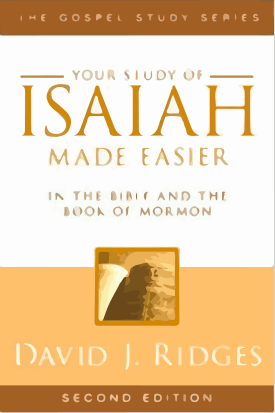After studying the two chapters of Isaiah in 1 Nephi 20 and 21, it is time to move on to 2 Nephi and it doesn’t take long to get back into Isaiah. Only this time its Nephi’s younger brother Jacob using the prophet. Jacob certainly has some of his ideas about Isaiah and he shares those thoughts in 2 Nephi 6
By way of background, Jacob is speaking to the Nephites who have separated recently (see Chapter 5) from the rest of Lehi’s family. As he begins to speak, Jacob reminds them he has been “called of God, and ordained;” consecrated by Nephi to speak to the people “exceeding many things.” Then he explains that he did it for the welfare of their souls, by exhorting and teaching the words of Lehi and “all things which are written, from the creation of the world” on the Brass Plates.
Then in verse 4, Jacob says:
I would speak unto you concerning things which are, and which are to come; wherefore, I will read you the words of aIsaiah. And they are the words which my brother has desired that I should speak unto you. And I speak unto you for your sakes, that ye may learn and glorify the name of your God.
Okay then, Jacob, on assignment from Nephi, is going to use Isaiah and so he continues in verse 5:
And now, the words which I shall read are they which Isaiah spake concerning all the house of Israel; wherefore, they may be alikened unto you, for ye are of the house of Israel. And there are many things which have been spoken by Isaiah which may be likened unto you, because ye are of the house of Israel.
Then he jumps right back to Isaiah 49
Isaiah 49
|
2 Nephi 6
|
| 22 Thus saith the Lord God: Behold, I will lift up mine hand to the aGentiles, and set up my bstandard to the people; and they shall bring thy sons in their carms, and thy daughters shall be carried upon their shoulders. x |
|
| 3 And akings shall be thy bnursing fathers, and their queens thy nursing mothers; they shall bow down to thee with their face towards the earth, and lick up the dust of thy feet; and thou shalt know that I am the Lord; for they shall not be ashamed that cwait for me. |
Then Jacob shares his commentary on these two verses, explaining, that the Lord has shown him that those living in Jerusalem “have been bslain and ccarried away captive.(vs 8)” But, he says the Lord showed him they would return again, “And he also has shown unto me that the Lord God, the Holy One of Israel, should manifest himself unto them in the flesh; and after he should manifest himself they should bscourge him and ccrucify him, according to the words of the angel who spake it unto me”(vs 9).
Jacob says that even though the Jews were allowed to return to Jerusalem, when Jesus came, in the end, they would not recognize Him and crucify Him. As a result, the Jews will lose God’s favor, they were killed, captured and further dispersed by the Romans.
Interpreting the two verses above, Jacob, says “because of the prayers of the faithful… the Lord will be merciful unto them, that bwhen they shall come to the cknowledge of their Redeemer, they shall be dgathered together again to the elands of their inheritance.”(vs.11).
Jacob returns to Isaiah 49 and reads verses 24–26, where he says the Gentiles, of whom Isaiah, has written, shall be saved and work to restore the covenant people to Israel, so that at the Savior’s Second Comming “the bMighty God shall cdeliver his covenant people”(vs. 17) and know that he is their Messiah.
Isaiah 49 |
2 Nephi 6 |
Changes in the Book of Mormon are in RED, while deletions are |
|
| 24 For shall the prey be taken from the mighty, or the alawful captives delivered? | 16 aFor shall the prey be taken from the mighty, or the blawful captive delivered? |
| 25 But thus saith the Lord, even the captives of the mighty shall be taken away, and the prey of the terrible shall be delivered; for I will contend with him that contendeth with thee, |
17 But thus saith the Lord: Even the captives of the mighty shall be taken away, and the prey of the terrible shall be delivered; afor the bMighty God shall cdeliver his covenant people. For thus saith the Lord: I will contend with them that contendeth with thee— |
| 26 And I will afeed them that oppress thee with their own flesh; they shall be drunken with their own blood as with sweet wine; and all flesh shall bknow that I, the Lord, am thy cSavior and thy Redeemer, the dMighty One of Jacob. | 18 And I will feed them that oppress thee, with their own flesh; and they shall be drunken with their own blood as with sweet wine; and all flesh shall know that I the Lord am thy Savior and thy aRedeemer, the bMighty One of Jacob. |
It was only after these verses and explanation that Jacob turned to Isaiah 50 and 51. (To study those chapters click here).










 The third Sunday of Advent for many Christian churches is known as Gaudete (
The third Sunday of Advent for many Christian churches is known as Gaudete (


 Authors:
Authors: 